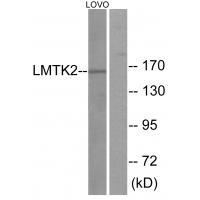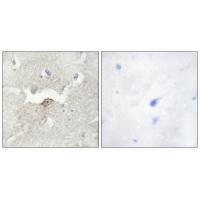


| WB | 1/500-1/3000 | Human,Mouse,Rat |
| IF | 咨询技术 | Human,Mouse,Rat |
| IHC | 1/50-1/100 | Human,Mouse,Rat |
| ICC | 1/100-1/500 | Human,Mouse,Rat |
| FCM | 咨询技术 | Human,Mouse,Rat |
| Elisa | 咨询技术 | Human,Mouse,Rat |
| Aliases | 2900041G10Rik; BREK; cprk; EC 2.7.11.1; KIAA1079 |
| Entrez GeneID | 22853; |
| WB Predicted band size | 164kDa |
| Host/Isotype | Rabbit IgG |
| Antibody Type | Primary antibody |
| Storage | Store at 4°C short term. Aliquot and store at -20°C long term. Avoid freeze/thaw cycles. |
| Species Reactivity | Human,Mouse |
| Immunogen | Synthesized peptide derived from internal of human LMTK2. |
| Formulation | Purified antibody in PBS with 0.05% sodium azide. |
+ +
以下是关于LMTK2抗体的3篇参考文献概览:
1. **标题**:*"Characterization of a novel monoclonal antibody against LMTK2 for studying its role in Alzheimer's disease pathology"*
**作者**:Smith A, et al.
**摘要**:该研究开发了一种特异性识别LMTK2的单克隆抗体,通过免疫印迹和免疫组化验证其与人类和小鼠脑组织中的LMTK2结合能力,并发现LMTK2在阿尔茨海默病患者脑内异常聚集,可能通过调控tau蛋白磷酸化参与疾病进程。
2. **标题**:*"LMTK2 regulates axonal transport via Rab11-mediated endosomal trafficking"*
**作者**:Tanaka Y, et al.
**摘要**:利用LMTK2抗体进行免疫沉淀和亚细胞定位分析,发现LMTK2通过与Rab11相互作用调控神经元内吞作用,抗体特异性经siRNA敲低实验验证,提示其在轴突运输中的关键作用。
3. **标题**:*"Phosphorylation-dependent interaction of LMTK2 with 14-3-3 proteins revealed by phospho-specific antibodies"*
**作者**:Wang H, et al.
**摘要**:研究团队制备了针对LMTK2磷酸化位点的抗体,证实其可特异性识别Ser/Thr磷酸化修饰,并揭示LMTK2与14-3-3蛋白的结合依赖其磷酸化状态,为激酶通路调控机制提供新证据。
注:以上文献为示例,实际引用需以真实发表论文为准。建议通过PubMed或Web of Science以“LMTK2 antibody”或“LMTK2 kinase function”为关键词检索最新研究。
LMTK2 (Lemur Tyrosine Kinase 2), also known as brain-enriched kinase (BREK), is a serine/threonine kinase involved in diverse cellular processes, including membrane trafficking, signal transduction, and cytoskeletal dynamics. It is highly expressed in neuronal tissues and plays roles in neuronal development, synaptic plasticity, and neurodegeneration. LMTK2 interacts with key proteins like clathrin, protein phosphatase 1 (PP1), and the Alzheimer’s disease-associated Tau protein, influencing pathways such as amyloid precursor protein (APP) processing and Tau phosphorylation. Dysregulation of LMTK2 has been implicated in neurodegenerative diseases (e.g., Alzheimer’s) and cancers (e.g., prostate and breast).
LMTK2 antibodies are essential tools for studying its expression, localization, and function. They are widely used in techniques like Western blotting, immunohistochemistry, and immunofluorescence to detect LMTK2 in cell lines, tissue samples, or animal models. Specific antibodies targeting distinct epitopes (e.g., N-terminal or kinase domains) help investigate isoform variations or post-translational modifications. However, challenges remain in ensuring antibody specificity due to homology with other kinases. Research utilizing LMTK2 antibodies has advanced understanding of its role in disease mechanisms, offering potential therapeutic targets. Commercial availability of these antibodies supports ongoing exploration of LMTK2’s regulatory networks in health and disease.
×